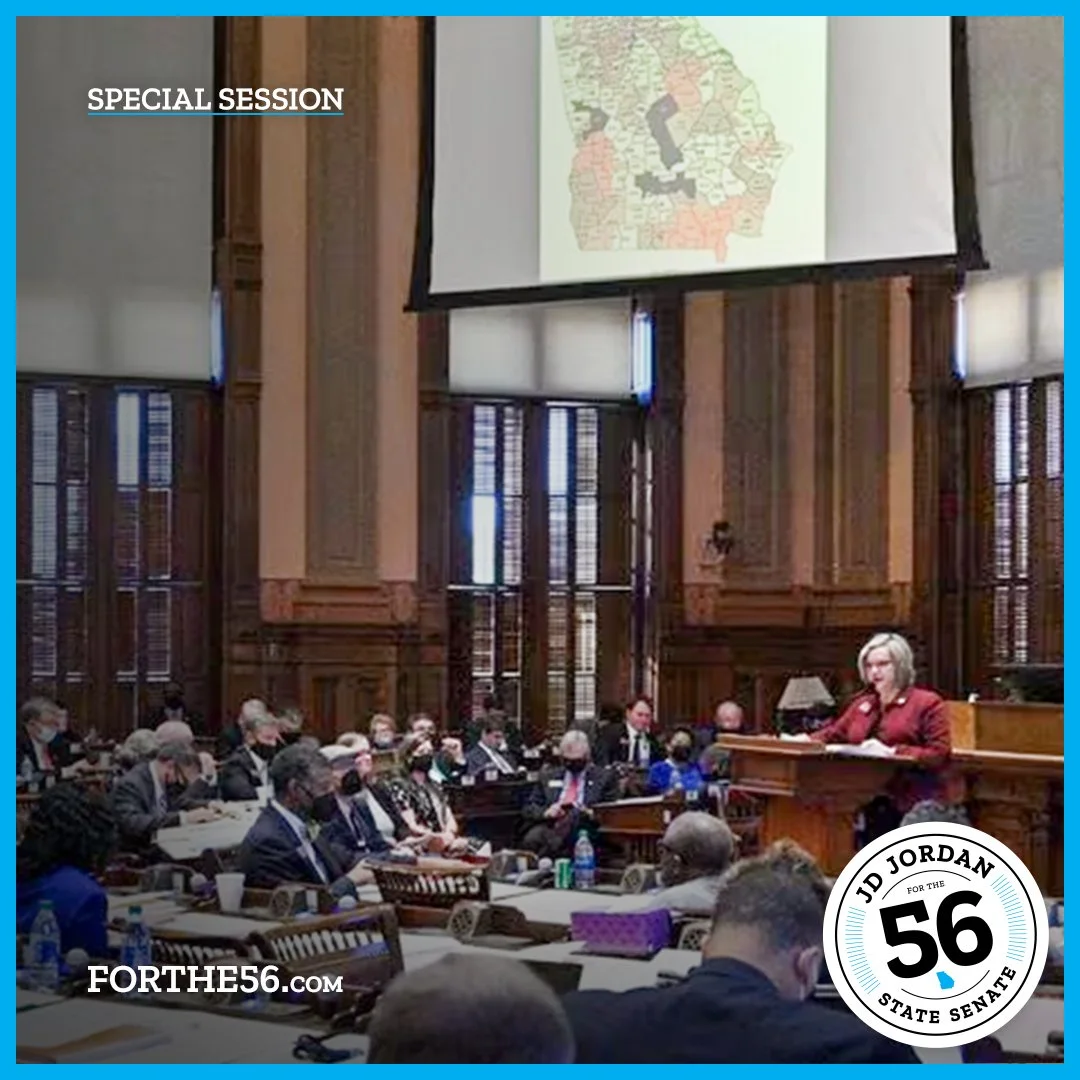People should choose their reps (not the other way around).
Georgia’s 2020 election results by The New York Times. Composition by JD Jordan.
It’s that time again: For Georgia’s Republican legislature to gerrymander the hell out of our legislative maps to determine which of us get to vote for or against each of them. And whatever the outcome, the process is opaque, undemocratic, and we deserve better.
Why are the maps being redrawn?
Every ten years, the states use updated census data to update their political maps. And while it’s perfectly legal—albeit undemocratic—for the majority party to redraw legislative maps in their electoral favor, it’s a violation of the Voting Rights Act to dilute the voting power of populations based on race or language.
On that last point, U.S. District Judge Steve Jones recently ordered Georgia to reformulate its congressional, state Senate, and state House maps to better reflect the racial demographics of its voters. And because Alabama recently tried to defy a similar court order, the judge was very prescriptive in his ruling, defining five congressional, 10 state Senate, and 11 state House districts need of remedy.
And he gave our legislature until December 8 to do it.
Thus, we have an eight-day Special Session beginning Wednesday, November 29, to redraw Georgia’s political maps ahead of the 2024 election.
Stateaffairs.com has put together a great guide to this Special Session, including who to watch, terms you may hear, a timeline, and more. Check it out.
What does this mean for voters?
Potentially a lot. State republicans will move districts around—perhaps a little, perhaps a lot—to comply with the court while maintaining as much electoral advantage as they can. You might have a new federal or state representation by the end of next week with no say in the matter.
What does this mean for elected officials?
Probably little. There’s a “gentlemen’s agreement” not to draw any sitting official out of their district, so likely anyone elected in 2022 will remain in their district going into 2024. But it’s not a rule: In 2022, Lucy McBath was drawn out of her Congressional District (including the 56’s Roswell and Mountain Park).
What does this mean for candidates?
Potentially a lot. Those of us who’ve already filed our intents to run could be drawn out of our districts with no notice.
An independent redistricting commission.
Georgia State Senate District 56 and composition by JD Jordan.
Georgia Speaker of the House Jon Burns recently told reporters, he believes the federal court will be happy with the new maps state Republicans have drawn up. And hopefully he’s right. But a long-term and well-tested solution to our contentious and partisan map-drawing process would be the creation of an Independent Redistricting Commission.
An Independent Redistricting Commission (IRC) is a bipartisan or nonpartisan body responsible for drawing electoral district boundaries. The primary goal of such a commission is the creation of fair and impartial political maps that accurately represent the population, ensuring that neither political party gains an unfair advantage through the manipulation of district boundaries (you know, gerrymandering).
Sounds pretty good.
As we’ve discussed, gerrymandering involves drawing electoral district boundaries in a way that favors one political party over another. Or, as I prefer to think of, it’s when a politician chooses their electorate because they’re afraid their given electorate won’t choose them (John Albers, I’m looking in your direction). This can be achieved by concentrating voters of one party into a small number of districts (packing) or by spreading them out across multiple districts (cracking).
IRCs, on the other hand, are typically composed of individuals not directly affiliated with either political party, include representatives from diverse backgrounds, or are entirely nonpartisan. And while the specific structure and process of an IRC varies by jurisdiction, they have been established both through legislation and voter initiatives in eight states (AZ, CA, CO, IO, MI, MO, OH, UT).
It's time for Georgia to consider enhancing transparency, public input, and fairness while promoting a more representative and responsive democratic system. And in light of our current legal challenges, it’s time for us to save legislative time and taxpayer money with a more open and honest approach to representation.
Get involved with Georgia’s new maps.
The re-distracting process is a lot.
Over the course of the last few days, new state Senate and House maps have been revealed and proposed Congressional maps could drop any day. And while the redistricting process in inherently undemocratic, that doesn’t mean we have to wait for the end of the Special Session to keep up or be heard.
Follow the action under the Gold Dome.
You can track the schedule of the current Special Session via the Georgia legislature website’s search. You’ll see, it’s a lot more than just maps: The state House and Senate are also considering whether to condemning Hamas and codifying support for Israel, to recognize the late first lady Rosalynn Carter, and well as a handful of other rules and appointment maters.
Most of the reapportionment and redistricting committee’s hearings are open to the public. The daily legislative schedule is available online and, if you can’t be there in person, you can watch the most meetings in real time or recorded via the General Assembly’s webite.
Check out the proposed maps.
The Georgia GOP majority’s proposed maps are available on the Legislative and Congressional Reapportionment Office’s website. As of this writing, proposed house Senate and House maps are online.
Share your feedback and be heard.
Written comments can be submitted (and viewed) by the public through a portal available on the Georgia General Assembly website.
Keep up with the news.
The AJC, their excellent Politically Georgia podcast, and StateAffairs each have excellent coverage of the re-districting process, including breaking news and expert analysis.
Inside Georgia’s new state Senate maps.
Senate 2023 Packet by Lindsey Basye and composition by JD Jordan.
On Tuesday, the GOP majority in the state Senate proposed new district maps and former GA congressman John Barrow—the most-gerrymandered congressperson in US history—joined AJC’s political team to review them. Here are a couple takeaways to help you understand how the maps changed and whether or not they’re likely to pass legal review.
AJC: How did the state Senate respond to the judges’ order?
Barrow: There is an affected area of about 10 Senate districts where the growth in the population of the African American voter is such that failing to recognize that [growth] in the maps deprives them of an opportunity to elect a candidate of their choice that is equal to or greater than what their predecessors had 10 years before.
[Instead], Republican Senate leaders used this [process] to insulate and preserve two Metro Atlanta Republican incumbents whose districts are becoming more competitive while also taking aim at two rising stars in the Senate Democratic Caucus.
They're moving massive numbers of people around but the net gain of voice for voters who are underrepresented is only 3,000 African American voters. [That leaves] 100,000 people out in the cold. That, to me, is wildly out of sync.
AJC: Does Judge Jones have good reason to reject these new maps?
Barrow: Yes, for two reasons.
First, the remedy extends into areas where the judge specifically found there was no violation.
Secondly, the remedy does not give voice to the people who are the intended beneficiaries of section two of the Voting Rights Act: Communities of racial interest who have been systematically deprived of an equal and fair opportunity to elect the candidate of their choice.
In this case, the remedy adopted by Senate leadership extended into areas and drew people in and out of the districts where they're currently represented—where there was no violation—to produce a net number of Democrats and Republicans. Which really shows that the only community of interest that matters to mapmakers when it comes to gerrymandering is the partisan divide: Republicans versus Democrats.
Listen to the whole conversation.
Barrow had a lot more to say about gerrymandering, in general, and the state Senate maps, in particular. Give at all a listen out on yesterday’s Politically Georgia.
How close are Georgia’s maps to a nuclear option?
Georgia state Rep. Mack Jackson, D-Sandersville, looks at a map of proposed state House districts before a House hearing, Wednesday, Nov. 29, 2023, at the Georgia Capitol in Atlanta. Photo by AP Photo/Jeff Amy.
When Alabama’s state legislature refused the federal court's mandate to draw a second majority-Black district, the judge responded by appointing an independent court-appointed expert to redraw their congressional map for the 2024 election.
Alabama Republicans surrendered their districting authority and their whole state is now on the chopping block.
They chose the nuclear option.
So, how close is Georgia to the same fate? Especially with Judge Jones’ December 8 deadline creeping closer by the day?
On Thursday, Georgia Republicans pushed forward with proposed legislative maps that preserve their majorities in the state House and Senate, voting 7-5 in the Senate and 9-5 in the House—both along racial and party lines—to advance their maps. Both bills advance to their full chambers and could be debated as soon as Friday.
But the fact remains—and has been well voiced by state Senate and House democrats as well as journalists and other political observers—the Georgia GOP’s proposed maps do not adhere to Judge Jones’ very detailed ruling and remedy.
House Minority Leader James Beverly response to the Republican maps, sums up the problem well:
The truth of the matter is that [Democrats] have delivered a map that we’re sure complies with the judge’s order. Y’all have not. There is a remedy. If we were to look at the area south and west of Atlanta, there’s one representative that you’re trying to save, but that one representative that you save is going to cost us all in the end. If you accept our map, then one representative may be eliminated. That’s the will of the voters. If you don’t accept our map and the judge has to do a special master, then every last one of us, 180 of us, are in jeopardy. Y’all have some big decisions to make.
If Judge Jones rejects the Republican maps, Georgia might end up in the same boat as Alabama: with districting authority stripped away as we head into a 2024 election cycle where control of both the state and federal legislature are on the line.
Let’s keep watching this Special Session as it continues to unfold, next week.
JD JORDAN FOR GEORGIA STATE SENATE DISTRICT 56
For anyone in East Cobb, Roswell, or Woodstock alarmed by the state’s escalating attacks on our bodies, our families, our doctors’ offices, our classrooms and libraries, even our polling places, I’m running for state senate district 56 to fight for our freedoms and to deliver a better future for everyone in Georgia.
And unlike my opponent who’s spent 14 years rolling back our freedoms, failing to safeguard our kids, and gerrymandered his district to stay in office, I promise to bring everyone in the 56—regardless of ideology—the best possible constituent experience so you feel heard, valued, and supported. As we all deserve to be.
I’m running for the 56. Let’s make a better Georgia for all of us.
—
FOR MORE INFORMATION, CONTACT
Jordan For Georgia, LLC
10800 Alpharetta Hwy Ste 208 #629
Roswell, GA 30076-1467
jdjordan@forthe56.com
706.804.0456











